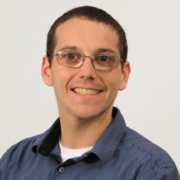Jared Rennie, Research Meteorologist, North Carolina Institute for Climate Studies

Please describe your educational background and what sparked your interest in atmospheric or related sciences.
Like most people I became fascinated with weather after experiencing a weather event. For most people it's a tornado or hurricane. Mine, however, was a simple squall line that passed through Plymouth, Massachusetts, while camping overnight with the Boy Scouts. After that event, I became glued to the weather, checking the Weather Channel before any camping trip I would go on.
When it became time to figure out college, I realized that I was really into weather so much that I decided to study it. I went to Plymouth State University in New Hampshire, where I received my bachelor's and master's degrees in Meteorology.
What was your first job in the field and how did you end up in the job you are in now?
I cannot confirm this as the main reason, but I got my first job through a conversation at the AMS Annual Meeting.
During graduate school, I presented a poster of my work during the AMS Annual Meeting, held in Atlanta, GA, in 2010. During that time I spoke to someone about my work, which required a lot of NEXRAD Level III data from NOAA's National Climatic Data Center (NCDC, now known as NCEI). Naturally enough, when I applied to a research position opening up, this person was on the selection committee.
I cannot confirm it was a coincidence or not, but it goes to show that networking can go a long way.
What opportunities did you pursue that you knew would be beneficial to securing a job in the profession?
A BAMS article written by Dr. John Knox in 2008 indicated that at the time, there were more students receiving a bachelor's degree in meteorology than available jobs. That was a huge sign for me to go to graduate school. I also knew that I had to meet people at professional conferences such as those provided by NWA, AGU, and AMS in order to get my name out there.
What other courses/skills beyond the required math and science courses do you think would be the most helpful to individuals wanting a career in your profession?
I think it varies, depending on the sector and job one is looking for. Personally, I regret not taking courses in Geographic Information Systems (GIS) while in college. I quickly found out in my job that learning does not stop after college—therefore I applied to the GIS Certificate Program at NC State. I also believe that in the research field, having a good computer science background can be key. We have petabytes of data archived at NOAA's National Centers for Environmental Information (NCEI), and being able to access, analyze, and map that data is critical for weather and climate research.
But it doesn't stop there. Being able to communicate the data and results can be a tough nut to crack as scientists. That's why taking communication courses is really important.
What is your typical day on the job like?
I sit in an office cube and code most of my day. I love it.
What do you like most about your job? What is the most challenging thing about your job?
I am very fortunate to work inside the NC State system. I have the opportunity to write papers, present research at conferences, and take courses at very little cost to me. Not all early career professionals get the opportunity to do this, and I am thankful of the opportunities the institution has provided me.
I think the most challenging piece is communication. One can create an amazing plot using weather and climate data, but if the public does not understand you in 10 seconds or less, you've completely lost them. Being able to make it relatable to the person viewing the graphic is something I've been dedicated to recently.
Does your job allow for a good work/life balance? If not, why?
It does, but most of the time, that needle will always point to life. I am currently married with one child, and whenever something comes up, like a sickness or family event, I have to immediately drop my work and focus on my family. There are more important things than answering an email at 6pm on a Wednesday.
Over the course of your career what is the most exciting thing that has happened to you?
I was really excited in receiving the Certified Consulting Meteorologist recognition from AMS. I first heard about it at my first AMS meeting in 2008, and I said to myself then "man, that'd be really cool to get." 10 years later, I was able to receive it, and it has helped push my career forward in ways I couldn't imagine.
Is there anything you wish you had done differently in your career?
To quote Aaron Rogers of the Green Bay Packers: "R-E-L-A-X"
What are some "must haves" on a resume if a person wants to gain employment in your field?
Currently, it's all about computer science and information technology. Everyone has the skills in meteorology and climatology, but if you can't analyze lots of data and communicate it efficiently, then the work becomes exponentially harder.
Skills such as GIS, programming, and cloud technologies will go a long way.